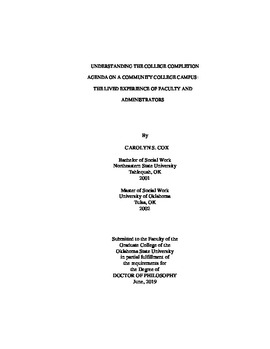| dc.contributor.advisor | Moore, Tami | |
| dc.contributor.author | Cox, Carolyn S. | |
| dc.date.accessioned | 2020-01-30T15:03:03Z | |
| dc.date.available | 2020-01-30T15:03:03Z | |
| dc.date.issued | 2019-06 | |
| dc.identifier.uri | https://hdl.handle.net/11244/323341 | |
| dc.description.abstract | Former President Obama and business leaders placed community colleges at the center of a plan to avoid a shortage of skilled workers, relying heavily on the 2-year institutions to educate prospective employees and, thereby, uplift the nation's economy (Bailey, 2012) Several non-governmental organizations and charitable foundations responded by creating various national degree completion programs, known as the College Completion Agenda (CCA). In the push to increase degrees, student-learning outcomes may be overlooked and faculty roles ignored by external agencies and institutional administrators. There continues to be little empirical research focused on understanding practitioner knowledge and experiences regarding college degree attainment initiatives. The inclusion of both administrator and faculty experiences provided a rich empirical dataset relevant to an ongoing national conversation about reconciling emphasis on graduation statistics and learning outcomes in the evaluation of college completion initiatives. | |
| dc.description.abstract | This case study explored the lived experiences of 5 administrators and 6 faculty members while implementing degree completion initiatives on an urban community college campus. Five themes and six sub-themes emerged from the data and revealed both the processes and possibilities for future reform initiatives. While collaborating with Achieving the Dream (AtD) coaches, participants spoke about developing a data-driven picture of the institution's strengths and weaknesses. Multiple course redesigns transpired in those programs where the greatest student attrition occurred, beginning with developmental math and English courses to college credit-bearing classes required for a degree. An outcome of these restructured courses was a "set curriculum" and assessment across all course sections. Quad-C administrators increased their dedication to increasing degrees through faculty professional development, partnering with Complete College America, and a new strategic plan. As a result, more students began to successfully complete their courses, and the institution experienced an increase in persistence and retention rates and college degrees. An open social system model was applied to the data in a post hoc fashion as a tool to examine first, the interaction between the environment and the institution and second, the interaction taking place internally between the multiple sub-systems of actors. | |
| dc.format | application/pdf | |
| dc.language | en_US | |
| dc.rights | Copyright is held by the author who has granted the Oklahoma State University Library the non-exclusive right to share this material in its institutional repository. Contact Digital Library Services at lib-dls@okstate.edu or 405-744-9161 for the permission policy on the use, reproduction or distribution of this material. | |
| dc.title | Understanding the College Completion Agenda on a Community College Campus: The Lived Experience of Faculty and Administrators | |
| dc.contributor.committeeMember | Blum, Denise F. | |
| dc.contributor.committeeMember | Kearney, Kerri | |
| dc.contributor.committeeMember | McGaha, Valerie | |
| osu.filename | Cox_okstate_0664D_16314.pdf | |
| osu.accesstype | Open Access | |
| dc.type.genre | Dissertation | |
| dc.type.material | Text | |
| dc.subject.keywords | college completion agenda | |
| dc.subject.keywords | community college | |
| dc.subject.keywords | course redesign | |
| dc.subject.keywords | faculty | |
| dc.subject.keywords | professional development | |
| dc.subject.keywords | set curriculum | |
| thesis.degree.discipline | Educational Leadership and Policy Studies | |
| thesis.degree.grantor | Oklahoma State University | |
